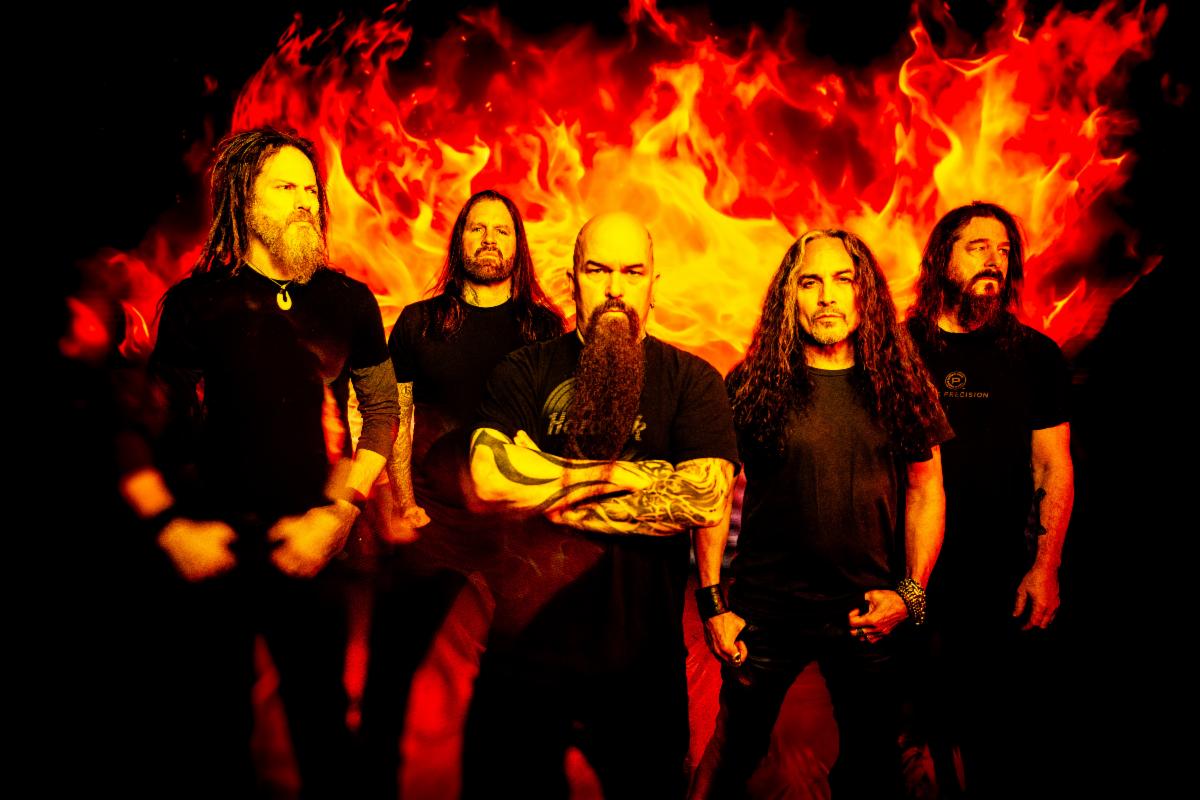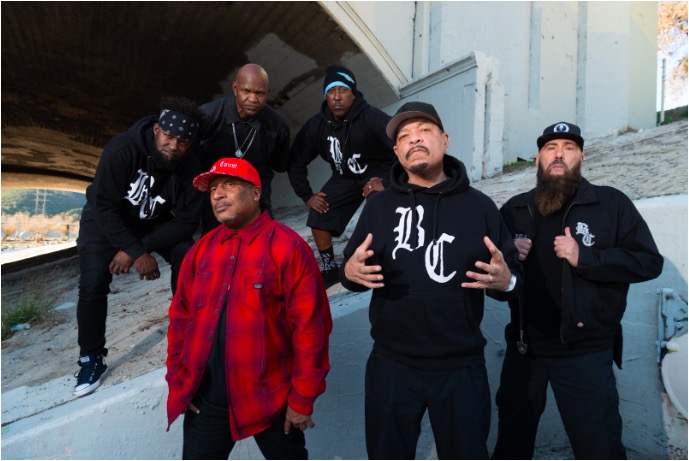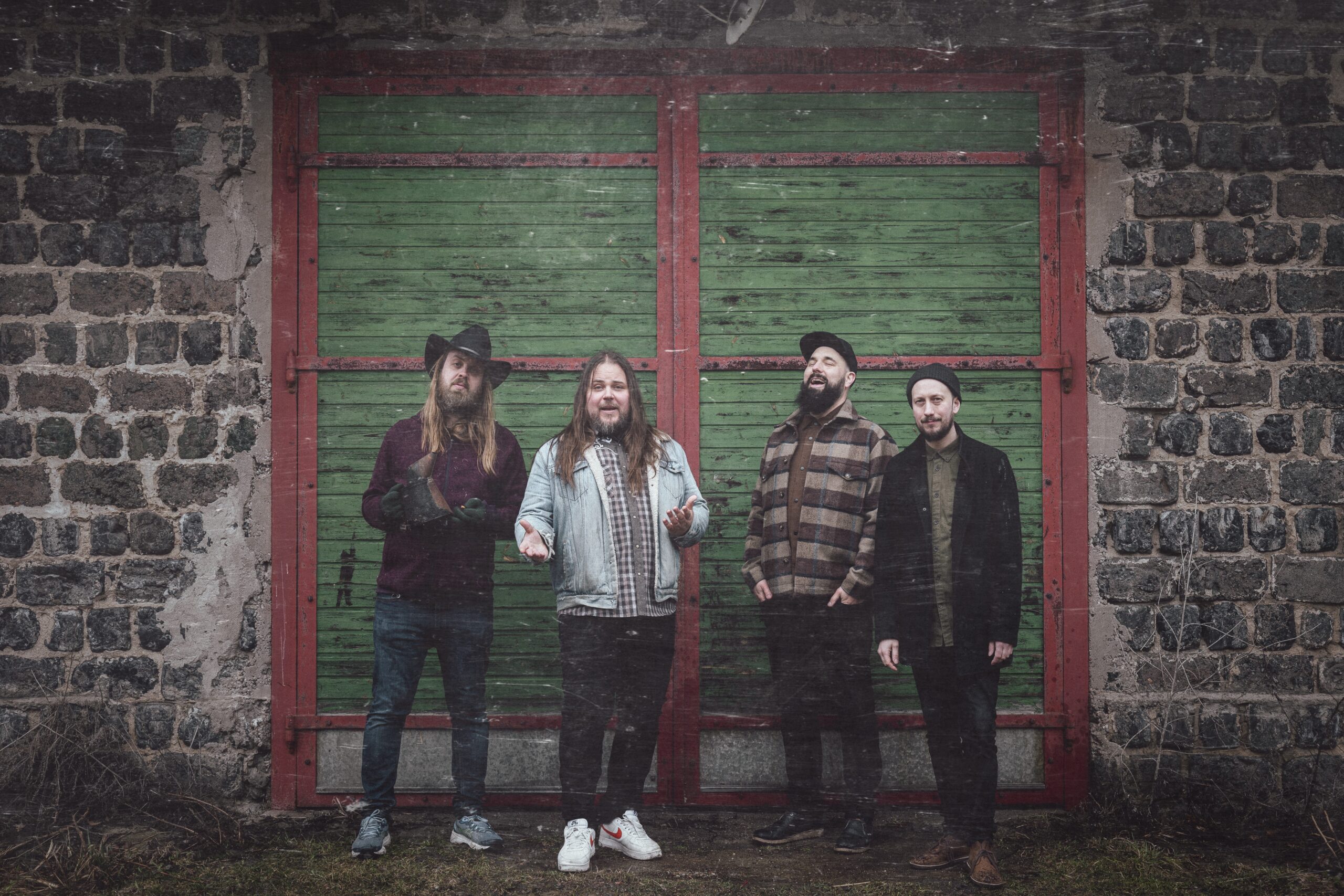The first Deicide album in six years was always going to be something of an event. As it turns out, Banished By Sin is an absolutely devastating entry in the band’s storied canon. A monstrous, darkly dynamic record, it really stands out as one of the year’s best extreme metal albums and fans of Deicide should be rightly proud of what their band has achieved with this release.
We were lucky enough to catch up with founding member and drummer Steve Asheim to talk about the genesis of the record, the impact of the pandemic, and the future plans of the band. What stands out throughout the interview is Steve’s passion, both for the process of making music in general, and for the band specifically. With a dry sense of humour, and an infectious enthusiasm, he comes across as Deicide’s biggest fan, and he is as fulsome in praise for the contributions of the other members as he is happy to discuss his own part in the process.

Hey this is Phil calling from SonicAbuse.
Excellent – good to talk to you.
Thank you so much for making the time for me, it’s much appreciated.
Oh, me too, I really appreciate it too.
So, the first question I have for you is that I was reading about your musical background and one of the things that stuck out is that you listen to classical compositions, and particularly piano, to look at how structures come together. Is that correct.
That’s right, I have listened to a fair amount of classical music over the years and certainly the piano. I even got to play in there for a good while. Yeah, it’s just a great form It’s very creative, very varied, and they have a pretty unique approach to how they write and put together songs, and I felt like it was a great help and very interesting to hear. I feel like it helped me a lot in my writing as far as how you can take a riff and get the most out of it, you know.
For me, one of the things I think is really interesting is that really well played piano pieces give this incredible sense of dynamic, and that’s obviously incredibly important to a drummer as well.
I couldn’t agree more. Like I say, dynamics go from soft to pounding and everything in between; from slow to fast; form staccato to legato; just every variant you could do with a song, you can bring that out on the piano. So, when we’re creating riffs and songs, and beats, I definitely learned about how to bring variation to a piece of music. Even though it’s heavy metal – it doesn’t seem like there’s a whole lot of variation you could do within that context – but we try to do what we can to keep the music interesting and with variation and uniqueness about it. And I think, definitely for me, listening to a lot of classical helped broaden my horizons as far as song writing, composition, and how to approach a piece of music. It’s how to get the most out of it.
Yeah – to me dynamic is so important, and I think it’s kind of something that’s unsung in heavy metal because although it is, by definition, loud as hell, the band’s that stand the test of time – whether you’re talking about Slayer or Black Sabbath – they have that dynamic, and that’s what makes the aggressive stuff sound huge.
I definitely agree with that. You can take the listener on a journey – it’s corny, but it’s true! Because you start low and then you build it up to an apex, and I hate to use the word “climax” [laughs] – but you can build it to a peak, you know. And then you go back into the valley, and then you peak again, and it really is a sonic journey that you can go on (at least if you do it correctly). And I feel like we’ve done pretty good at our song writing over the years, and I think we’re pretty good at giving that to people – giving them a really good listen, you know?
In terms of developing the songs, obviously as a multi-instrumentalist in the band, how much of a hand do you have in developing the overall sound of the songs?
Well, you know, from top to bottom. I definitely write riffs and songs from top to bottom – the riffage. And I generally have a good idea of what the drums could be, you know I go with the arrangements of the songs from building up harmonies, and building up variations, and what order to use those variations, and what will be the most effective execution of a piece of music. Like I said, having an effective beginning, middle, and end, and making the whole thing cohesive within itself. And then, once we have an entire record, making the entire record cohesive in that sense. Making sure we’re not repeating ourselves structurally, or with an idea; and if we are, find some way to make it different so it’s not so obvious. But there’re many ways to go about that. I think we’ve mastered that; we’ve got a pretty good formula for how to. Make a diverse sounding record. It’s all very heavy, but I feel like we can still make the songs recognisable to themselves – they all have their own identity and they’re recognizable. It’s just a good listen. You don’t feel like it’s repeating on you.
You said it perfectly earlier when you talked about taking the listener on a journey, and that’s (I think) why so many of us get into music, and particularly listening on vinyl and stuff. And one of the journeys you’ve been on as a band is seeing the fall, and then return of vinyl – has that had an impact on how you sequence a record? Because, obviously, through much of the late 90s / early 00s, a lot of bands were really sequencing for CD, which is a very different journey to vinyl, where you have to consider how to open and close sides, as well as the album overall.
Well, you know, like you said, you want to be able to start strong and you want to be able to finish strong. Usually if there are, you know, filler songs, you kind of sprinkle them round about the last quarter of the record. People usually get a little worn out – bands like to put their strongest songs up front. But, you know, if you have all strong songs that you’re working with, it’s a good idea to lay those songs in and out of each other – like the ending of one song may fit with the beginning of the next song. You don’t want tempos to be matching with songs that are right next to each other, so you can take those songs and separate them on the record. Once you’ve picked out your first and last song of the record, as well as the ending song of the side and the opening of side b, it’s like a puzzle – all the pieces fall into place.
So, yeah, once you get those first four or five into place it becomes obvious where the others belong on the record. And when you do that, you can create a really well-flowing, entire album that is enjoyable to listen to the whole thing. You don’t have people fast forwarding song 4 or song 7, it’s like “wow!” One song flows into the next and you create a very nice listening experience and that’s what I like. You start at the beginning, you end at the end, and it’s like “wow, that went by fast!” And that’s because it was a good, fun listen.
It’s an amazing process to me and it’s such an important part of the album writing experience. And, on top of that, you’ve got all the other elements that play into that – the artwork and physical packaging. How involved are you, as a band, in that side of things?
Well, you know, we have specialties in the band. I’m the music guy. I like riffs, drums, arranging the songs, helping them come together. Lyrically – I’m not a big lyric guy. I can write lyrics, and I try, but they’re kind of more fitting for a punk album. They’re kind of humorous and snarky, and not really fitting to be deicide lyrics. So, I leave that to people who are better lyricists than me.
It’s the same with art. Growing up, I could trace and draw and shit like that, but Glenn is more of the visual guy, so artwork is kind of his department; music is my department; lyrics are his department; arranging is my department, and we all just stick to our strengths and luckily, we work well together in that sense. Everybody sticks to that, and we come up with a pretty good product.
We also can take criticism for each other because we believe it’s best for the material. We don’t really get our feelings hurt if the others rip on something, we just take it to heart, make whatever the problem is better, and that’s how you create a good song and album. It’s a process of elimination. You eventually eliminate all the criticised parts that people in the band have a problem with, while writing, and once you’ve got a version down, with all the weak parts criticised out of it, you’re on the right track!
I don’t know how you found it, but the pandemic through a massive wrench under the wheels of anyone creative; but there was also a sense that the world had stopped, and you weren’t able to do the things you normally do, so it was (to a degree) possible to be very creative. Did you spend the time producing more material, or did you find the experience made it very difficult to continue?
Well, you know, I took the time off. I thought the world was going to end, so I figured I’d play video games until I fucking starved to death or whatever was going to happen [laughs].
I had demoed pretty actively, I had like ten songs demoed in 2018, so I had plenty of music saved up if the world got its act together and we could get back in the studio. So, like I said, I had plenty of music stockpiled, and I didn’t worry about it. Once the world started to come back out of its hazer there – and in Florida, we were one of the first places to get open and, in fact, Deicide were one of the first bands to play live again after all that. So, I take a good amount of pride in that.
We took a lot of heat for it – we posted a video of the show and in the comments section, half the world was like “I can’t believe they have the gall to go out in public, they’re going to kill people with their germs!” And it was like, you know what, I think you people are getting a little carried away with the fucking drama.
We ended up being right. Two months later, the fucking world opened up, everyone started doing gigs again and everyone was just fine, you know.
That being said, I hate to thumb my nose at a health crisis. We certainly paid attention to see what was fact and what was fiction, and you know everyone can look back with hindsight and say we should have done it that way, or whatever. Let’s just put the whole fucking nightmare behind us and just get on with our lives at this point, that’s my take on it.

There was quite a long break between this and the last album, but of course you had all the anniversary shows to do as well, right?
Yeah. Like I said, the pandemic didn’t help. That took two fucking years off everyone’s careers. Plus, it took us a little time to get our line up straightened out. We had Mark English in the band, and he worked out for about a year, but on a personal level it just wasn’t really clicking. Then we got Chris Cannella in, who was a great guy, but on a professional level, it just wasn’t clicking. He was very wrapped up in his job and family, so he just didn’t have the time to dedicate to the band and what we needed. So, we were starting to lean into doing the Legion reunion stuff, it was just a bit too taxing on his time to show up. So, that’s when we came across Taylor, and he was full steam ahead. He showed up with five Legion songs learned, so it was like we hit the ground running with him. And so, like I said, between the pandemic, getting the Legion stuff down, that was an extra four years out of that six years. I think without the Pandemic and without taking the time to do Legion, we could have been on our regular album schedule, which is every two years or so. So, I’m hoping it will only be two or three years before the next record comes out… barring any future pandemics!
Don’t even joke about it!
Right? I’m telling you, something’s always coming!
In terms of Taylor joining the band, you said you had demos down – was it a case of filtering those through his experience, or did he have the chance to bring something to the table with the album?
Well, you know, we’re all music writers. I had seven or eight songs demoed and we need twelve songs, so we decided to do three each. So, I picked my favourite three form what I had. Kevin picked up his favourite three from what he had, Taylor worked up three of his own, Glen worked up three and, once we brought those to the jam room, we worked through our own songs with each other. Giving each other feedback and criticisms and deciding one what we could make better and sticking with what everyone liked, so it’s a process of elimination. Just eliminate what we don’t like about the songs until there’s nothing we don’t like about the songs, that’s how we know they’re done.
Having got everything together, you signed up with Reigning Phoenix Music – why did you choose them?
Well, it was a good offer and also Gerardo, who’s our contact there, just seemed the most enthusiastic about the band. He was in contact the most, he had the freshest ideas and approach, he seemed the most excited to work with us. He gave us the deal we wanted, he’s been in touch with us at any time and he’s done a good job of handling the game plan of how to release the album – bringing together the music videos, how to release them, he’s been coordinating with our agents, so that the tour aligns with the album release, so there’s an actual game plan.
Over the years, I’ve never been satisfied with our approach to these things, but with these really good people involved, I’ve been impressed with how they’ve approached the release and seeing that just makes me realise how important a good label and people working there are to making a good plan come together and really executing it. Someone has to work the phones and put these things together and, in this case, it’s Gerardo and Reigning Phoenix. So, they’ve done a good job, I’m really happy with it and hopefully we can work again on another record.
In my experience, putting a record together, you listen hundreds of times as you mix and master and everything else. Now that the dust has settled, are there any particular songs that stand out to you that you’re most proud of?
Yeah, there really are. I really like how my songs turned out. Like I said, I don’t really do lyrics, so the guys who worked up the lyrics, I was really happy with how they turned out. The vocal patterns and the actual lyrics themselves. It’s very powerful messaging and a very intense delivery. Usually, I think I’ve got a pretty good song going just in demo form and, once every9one else gets their hands on it, they end up coming out far better than I ever envisioned they could. So, yeah, this album came out far better than expected. That usually happens when you’re working with good, creative people, everyone can bring something more to it. And these guys demo to a drum machine, and I hope I brought more to the songs than a drum machine – and usually I can [laughs]. So, I think the guys are happy with what I could bring musically to their compositions and we’re all in there helping each other’s songs be better.
It’s a really strong, organic-sounding record as well. And I know that when Glen was talking about this album, he said there was a real focus on dynamic and not over-compressing the sound, which is where a lot of modern releases go.
Yeah, you can have a bunch of great songs and, when you’re recording it, everyone loves the raw tracks and then, when you get it to the mixer and, especially the mastering – they can compress the shit out of it in mastering and totally fuck up a great mix, so you’ve got to be on top of it every step of the way. It’s easy enough to hand it off to the next guy and say good luck, but you really do have to keep your ear on it and guide people where they need guiding.
With this particular record, I just think we made sure it was not overly compressed and the songs had space for these musical things to happen and be heard. It wasn’t just rushed in a playing sense. Legion is a very fast record. In fact, a lot of it is played too quickly. You can kind of tell, it sounds rushed. For the piece of time that it is, it is what it is, but it’s something we’re trying not to repeat on our records now. We want to give our songs time to space and breathe so these musical events can happen within the song. They’re not rushed. The vocals have time to breathe and be heard. They’re not rushed. So, it still sounds fast, but not rushed. I think it gives the songs a lot more time to breathe and the groovy parts to groove, and you accentuate the guitar playing – it’s clearer. You can appreciate the intricacies of it because you can hear it. You’re not playing so fast people can’t pick up on stuff.
My final question – I know you’re announcing tour dates. Are you coming over to the UK?
Yeah, I think we’re going over to Europe and England in the summer. I’m pretty sure we’re playing Bloodstock, and I think we’re maybe doing a couple of other shows in the UK. I know we’re booked for early 2025 – like 45 shows all over Europe, so I think we’re playing a lot of shows in Ireland, Scotland, England – we’ll be spending a lot of time in the UK. I think we’re going to Brighton – I heard about it in So What – Metallica talked about how they’d been to Brighton too! Well, I’m going to go to Brighton too! We always have a great time in England. Great people. It’s just an honour for me, honestly, to play in England, because of everything England has done for rock and metal They practically invented heavy metal. They invented the Marshall Stack. They have so many great bands and songwriters. It’s just great to go over and be part of the English music scene while we’re there. It’s just a real honour.
Amazing – thank you so much for taking the time to talk with you. It’s been a privilege and thank you for your time.
Thank you for your time and support. And thank the fans in your interview – I hope to see you at the gig enjoying the hell out of it, I know I will be.










Leave a Reply